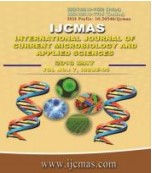


 National Academy of Agricultural Sciences (NAAS)
National Academy of Agricultural Sciences (NAAS)

|
PRINT ISSN : 2319-7692
Online ISSN : 2319-7706 Issues : 12 per year Publisher : Excellent Publishers Email : editorijcmas@gmail.com / submit@ijcmas.com Editor-in-chief: Dr.M.Prakash Index Copernicus ICV 2018: 95.39 NAAS RATING 2020: 5.38 |
Horse gram [Macrotyloma uniflorum (Lam.) Verd.] is one of the highly nutritious minor pulse crop and has number of desirable traits like drought tolerance, high protein content, antioxidant activity, antimicrobial and medicinal properties. A total of 66 genotypes of horse gram comprising 61 accessions of indigenous collections belonging to 15 states of India, one exotic collection from Australia and four checks were evaluated in Randomized Block Design (RBD) consecutively for three years [Kharif seasons of 2013 (E1), 2014 (E2) and 2015 (E3)] at ICAR-National Bureau of Plant Genetic Resources (ICAR-NBPGR), Regional Station, Akola, Maharashtra. Accessions were evaluated for seven each of qualitative and quantitative traits. Significant variability was observed among the accessions for most of the quantitative traits. Highest coefficient of variation was observed in seed yield per plant (g) followed by pods per plant and pod length. The phenotypic coefficients of variation (PCV) were higher than the genotypic coefficient of variation (GCV) for all the traits. The highest magnitude of PCV and GCV were recorded for seed yield per plant (g) and pods per plant followed by plant height (cm). Shannon diversity index (SDI) varied from 0.078 to 0.686 showed existence of sufficient variability among the accessions for qualitative traits. Accessions were classified on the basis of Euclidean distances using Ward’s method. The dendrogram revealed two major clusters. Cluster I comprised of 17 accessions and cluster II comprised of 49 accessions. Cluster II was further classified in two sub-clusters (IIa and IIb). Most of the accessions from Tamil Nadu were confined to cluster I indicating their similarity for quantitative traits. Whereas accessions from rest of the states were well distributed in cluster II exhibiting high diversity for the traits studied. The accessions from cluster I could be used for hybridization program with the accessions from cluster II in order to develop superior horse gram genotypes/varieties for overall yield enhancement.
 |
 |
 |
 |
 |